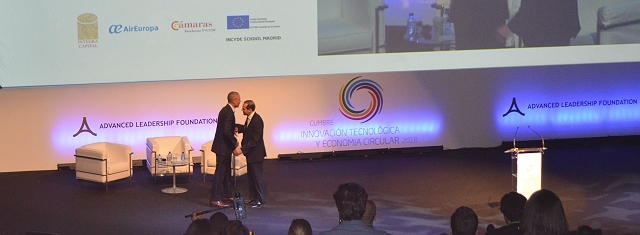Politics
Obama warned about the extraordinay changes in the world
Summit on Circular Economy

President Obama, in the Summit of Madrid (Source: Rosana Rivera)
USPA NEWS -
The world needs a new "sustainable model and respectful" with the environment. "That's the best for all of us," said Juan Verde, president of the Advanced Leadership Foundation, in the opening of the Summit on Technological Innovation and Circular Economy, which was held on Friday, July 6 in Madrid. The 44th US President Barack Obama participated in the Summit.
President Obama warned that the "extraordinary changes" the world is experiencing "are taking their toll on the social and political institutions" of all countries. "It is important to recognize that in these matters we are going to have to train our young people to think differently," Obama added, warning: "I do not believe that most governments and societies are prepared for these changes." He criticized President Trump's lack of interest in science and the environment.
Previously, the president of the Advanced Leadership Foundation, Juan Verde, pointed out the need to adopt "a new sustainable model that respects the environment". For this, he said, "we have to educate politicians to stop thinking about the upcoming elections and start thinking about the next generations."
Christopher Pissarides, Nobel Prize in Economics in 2010, insisted on the need to redouble efforts in technological innovation, as it can have a positive impact on work and well-being. It also focused on higher education and its responsibility in the transmission of knowledge to create new jobs within the framework of the circular economy. According to the European Commission, the circular economy can create more than 400,000 jobs in the EU over the coming decades. The challenge, pointed out several speakers, is to ensure that economic development and technological advances do not generate inequality. The Advanced Leadership Foundation will train local leaders throughout Spain to influence the policies and economics of their communities.
Following the inauguration, Bernardo Kliksberg, UN Advisor and CSR guru, and Dasho Karma Ura, Minister of Happiness of the Kingdom of Bhutan, shared their views on the current challenges of humanity and sustainability as a means to increase the welfare of citizens. In this sense, Karma Ura presented the case of Bhutan as an example of a country committed to protecting the environment and the transition to a low carbon economy.
Christopher Pissarides, Nobel Prize in Economics in 2010, insisted on the need to redouble efforts in technological innovation, as it can have a positive impact on work and well-being. It also focused on higher education and its responsibility in the transmission of knowledge to create new jobs within the framework of the circular economy.
Liability for this article lies with the author, who also holds the copyright. Editorial content from USPA may be quoted on other websites as long as the quote comprises no more than 5% of the entire text, is marked as such and the source is named (via hyperlink).





